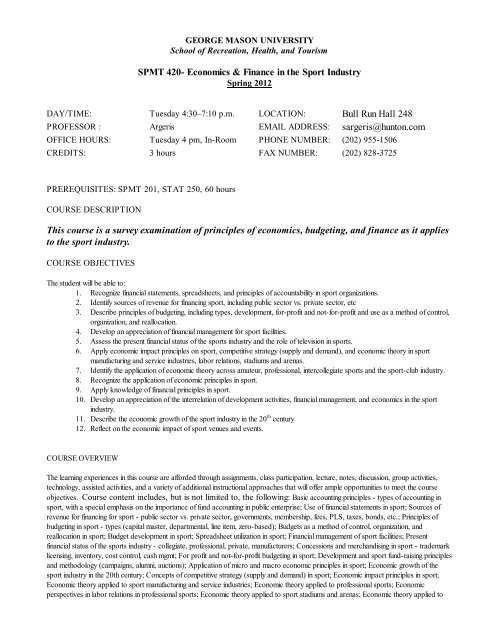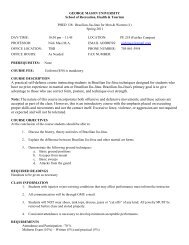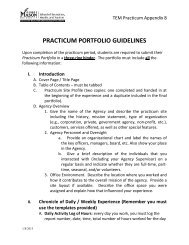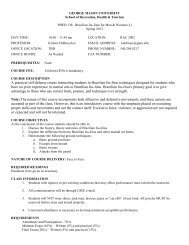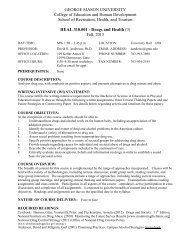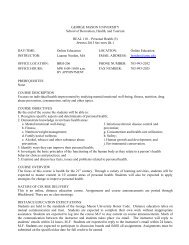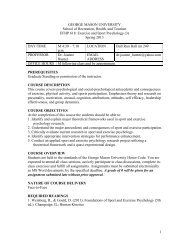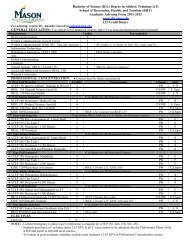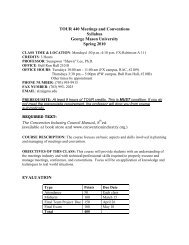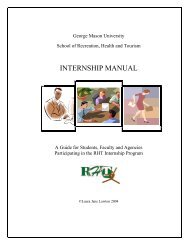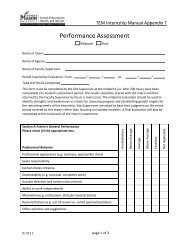Syllabus - School of Recreation, Health, and Tourism - George ...
Syllabus - School of Recreation, Health, and Tourism - George ...
Syllabus - School of Recreation, Health, and Tourism - George ...
Create successful ePaper yourself
Turn your PDF publications into a flip-book with our unique Google optimized e-Paper software.
GEORGE MASON UNIVERSITY<br />
<strong>School</strong> <strong>of</strong> <strong>Recreation</strong>, <strong>Health</strong>, <strong>and</strong> <strong>Tourism</strong><br />
SPMT 420- Economics & Finance in the Sport Industry<br />
Spring 2012<br />
DAY/TIME: Tuesday 4:30–7:10 p.m. LOCATION: Bull Run Hall 248<br />
PROFESSOR : Argeris EMAIL ADDRESS: sargeris@hunton.com<br />
OFFICE HOURS: Tuesday 4 pm, In-Room PHONE NUMBER: (202) 955-1506<br />
CREDITS: 3 hours FAX NUMBER: (202) 828-3725<br />
PREREQUISITES: SPMT 201, STAT 250, 60 hours<br />
COURSE DESCRIPTION<br />
This course is a survey examination <strong>of</strong> principles <strong>of</strong> economics, budgeting, <strong>and</strong> finance as it applies<br />
to the sport industry.<br />
COURSE OBJECTIVES<br />
The student will be able to:<br />
1. Recognize financial statements, spreadsheets, <strong>and</strong> principles <strong>of</strong> accountability in sport organizations.<br />
2. Identify sources <strong>of</strong> revenue for financing sport, including public sector vs. private sector, etc<br />
3. Describe principles <strong>of</strong> budgeting, including types, development, for-pr<strong>of</strong>it <strong>and</strong> not-for-pr<strong>of</strong>it <strong>and</strong> use as a method <strong>of</strong> control,<br />
organization, <strong>and</strong> reallocation.<br />
4. Develop an appreciation <strong>of</strong> financial management for sport facilities.<br />
5. Assess the present financial status <strong>of</strong> the sports industry <strong>and</strong> the role <strong>of</strong> television in sports.<br />
6. Apply economic impact principles on sport, competitive strategy (supply <strong>and</strong> dem<strong>and</strong>), <strong>and</strong> economic theory in sport<br />
manufacturing <strong>and</strong> service industries, labor relations, stadiums <strong>and</strong> arenas.<br />
7. Identify the application <strong>of</strong> economic theory across amateur, pr<strong>of</strong>essional, intercollegiate sports <strong>and</strong> the sport-club industry.<br />
8. Recognize the application <strong>of</strong> economic principles in sport.<br />
9. Apply knowledge <strong>of</strong> financial principles in sport.<br />
10. Develop an appreciation <strong>of</strong> the interrelation <strong>of</strong> development activities, financial management, <strong>and</strong> economics in the sport<br />
industry.<br />
11. Describe the economic growth <strong>of</strong> the sport industry in the 20 th century<br />
12. Reflect on the economic impact <strong>of</strong> sport venues <strong>and</strong> events.<br />
COURSE OVERVIEW<br />
The learning experiences in this course are afforded through assignments, class participation, lecture, notes, discussion, group activities,<br />
technology, assisted activities, <strong>and</strong> a variety <strong>of</strong> additional instructional approaches that will <strong>of</strong>fer ample opportunities to meet the course<br />
objectives. Course content includes, but is not limited to, the following: Basic accounting principles - types <strong>of</strong> accounting in<br />
sport, with a special emphasis on the importance <strong>of</strong> fund accounting in public enterprise; Use <strong>of</strong> financial statements in sport; Sources <strong>of</strong><br />
revenue for financing for sport - public sector vs. private sector, governments, membership, fees, PLS, taxes, bonds, etc.; Principles <strong>of</strong><br />
budgeting in sport - types (capital master, departmental, line item, zero-based); Budgets as a method <strong>of</strong> control, organization, <strong>and</strong><br />
reallocation in sport; Budget development in sport; Spreadsheet utilization in sport; Financial management <strong>of</strong> sport facilities; Present<br />
financial status <strong>of</strong> the sports industry - collegiate, pr<strong>of</strong>essional, private, manufacturers; Concessions <strong>and</strong> merch<strong>and</strong>ising in sport - trademark<br />
licensing, inventory, cost control, cash mgmt; For pr<strong>of</strong>it <strong>and</strong> not-for-pr<strong>of</strong>it budgeting in sport; Development <strong>and</strong> sport fund-raising principles<br />
<strong>and</strong> methodology (campaigns, alumni, auctions); Application <strong>of</strong> micro <strong>and</strong> macro economic principles in sport; Economic growth <strong>of</strong> the<br />
sport industry in the 20th century; Concepts <strong>of</strong> competitive strategy (supply <strong>and</strong> dem<strong>and</strong>) in sport; Economic impact principles in sport;<br />
Economic theory applied to sport manufacturing <strong>and</strong> service industries; Economic theory applied to pr<strong>of</strong>essional sports; Economic<br />
perspectives in labor relations in pr<strong>of</strong>essional sports; Economic theory applied to sport stadiums <strong>and</strong> arenas; Economic theory applied to
intercollegiate sports; Impact <strong>of</strong> the television industry on pr<strong>of</strong>essional sports; Impact <strong>of</strong> the television industry on intercollegiate sports;<br />
Economic impact <strong>of</strong> sport venues <strong>and</strong> events; Economic theory applied to the sport club industry; Relating infrastructure to competitive<br />
strategies in the manufacturing <strong>and</strong> service industries in sport.<br />
HONOR CODE<br />
<strong>George</strong> Mason shares in the tradition <strong>of</strong> an honor system that has existed in Virginia since 1842. The Honor Code is an integral part <strong>of</strong><br />
university life. On the application for admission, students sign a statement agreeing to conform to <strong>and</strong> uphold the Honor Code. Students are<br />
responsible, therefore, for underst<strong>and</strong>ing the code's provisions. In the spirit <strong>of</strong> the code, a student's word is a declaration <strong>of</strong> good faith<br />
acceptable as truth in all academic matters. Cheating <strong>and</strong> attempted cheating, plagiarism, lying, <strong>and</strong> stealing <strong>of</strong> academic work <strong>and</strong> related<br />
materials constitute Honor Code violations. To maintain an academic community according to these st<strong>and</strong>ards, students <strong>and</strong> faculty must<br />
report all alleged violations to the Honor Committee. Any student who has knowledge <strong>of</strong>, but does not report, a violation may be accused<br />
<strong>of</strong> lying under the Honor Code. Students in this course are held to the strictest st<strong>and</strong>ards <strong>of</strong> the <strong>George</strong> Mason University Honor Code.<br />
STUDENT SUPPORT<br />
Any eligible student with an exceptionality documented through <strong>George</strong> Mason University’s Disability Resource Center must notify the<br />
instructor so that suitable accommodations can be implemented. The notification should take place during the first week <strong>of</strong> classes.<br />
Expectations:<br />
1. All assigned reading for each class is to be completed prior to coming to class.<br />
2. All written assignments must be typed (computer word processing is recommended).<br />
3. Regular attendance <strong>and</strong> participation is expected.<br />
4. If you miss a class, it is your responsibility to obtain class materials from sources other than the instructor.<br />
5. Students must abide by the Honor Code, guided by the spirit <strong>of</strong> academic integrity.<br />
Class Attendance:<br />
It enhances your academic success to be in class; therefore, you should attend all scheduled class meetings in accordance with <strong>George</strong><br />
Mason policy: Students are expected to attend the class periods <strong>of</strong> the courses for which they register. In-class participation is important<br />
not only to the individual student, but to the class as a whole. Because class participation may be a factor in grading, instructors may use<br />
absence, tardiness, or early departure as de facto evidence <strong>of</strong> nonparticipation. Any student who does not attend at least 60% <strong>of</strong> the<br />
classes will not pass the course. Excessive absences or tardiness result in lowering <strong>of</strong> your grade. Students who miss an exam with an<br />
acceptable excuse may be penalized according to the individual instructor's grading policy, as stated in the course syllabus.<br />
Participation:<br />
Respect the free exchange <strong>of</strong> thought in an academic environment <strong>and</strong> the participants therein. For example: a) do not have any sound<br />
emitting devices turned on; b) wait until the teacher/guest speaker has finished prior to gathering your belongings; <strong>and</strong> c) do not smoke,<br />
chew tobacco, eat, sleep, disrupt others by inappropriate talking, or disrespect the class schedule by being tardy. You are encouraged to a)<br />
feel free to openly <strong>and</strong> respectfully contribute your thoughts; b) listen actively to the comments <strong>of</strong> others; c) be punctual; d) ask any <strong>and</strong> all<br />
appropriate questions that you have; <strong>and</strong> e) maintain civility in your interpersonal communications. Class discussions will be conducted in a<br />
civil, informed fashion wherein disruptive students will be asked to leave the class. Your contributions are not only welcomed, they are<br />
essential. This may also apply to laptops…if they are not needed during discussions, they should not be opened/on.<br />
Alternative Work:<br />
Make-up work is not allowed in this class. Only those excused absences supported by documentation will be addressed at the instructor’s<br />
discretion on an individual basis (e.g. a physician’s note for an illness). Alternative work due to intercollegiate athletic competitions or other<br />
legitimate university activity must be arranged – prior -- to due date. A grade <strong>of</strong> zero (‘0’) will be assigned to all missed work unless<br />
otherwise determined by the instructor. There will be no extra credit option in this course.<br />
REQUIRED READINGS<br />
Readings will include assigned chapters within the text <strong>and</strong>/or current articles <strong>and</strong> news in sport management (e.g. Sports Business Journal,<br />
internet articles, etc.) to be determined by instructor.<br />
Students will be required to be prepared each week with a reading (article, internet item, etc.) directly related to the course content for<br />
class discussion.
Required Texts: Sawyer, T.H., Hypes, M.G., & Hypes, J.A. (2004). Financing the Sport Enterprise. Champaign, IL: Sagamore<br />
Publishing.<br />
Subscription to Street <strong>and</strong> Smith’s Sports Business Journal (information on reduced-rate subscription will be provided to students at first<br />
class.)<br />
Guest speakers may be utilized to exp<strong>and</strong> upon topics covered in the assigned readings <strong>and</strong> class lectures.<br />
Pr<strong>of</strong>essor may provide additional supplemental readings as required by current events <strong>and</strong>/or class interests.<br />
EVALUATION<br />
Graded Assessment:<br />
Assessment <strong>of</strong> student objectives <strong>and</strong> performance will include, but is not limited to, successful completion <strong>of</strong> a combination <strong>of</strong> quizzes,<br />
exams, written <strong>and</strong>/or oral projects/presentations, <strong>and</strong> regular in-class <strong>and</strong>/or out-<strong>of</strong>-class assignments.<br />
Specifically, graded assessments will include (please note that requirements <strong>and</strong> expectations for grading for each assessment will be<br />
explained in detail in class prior to assignment being due):<br />
a) Two in-class quizzes (to cover assigned readings <strong>and</strong> class lectures). Each will include short answer/essay questions, <strong>and</strong> will<br />
count as 15% <strong>of</strong> final grade;<br />
b) “Case” paper. A 1000-word report on a topic assigned in Class Three, <strong>and</strong> will count as 20% <strong>of</strong> final grade;<br />
c) “Formal” group class presentation & paper, on a topic mutually agreed upon between pr<strong>of</strong>essor <strong>and</strong> student on a subject<br />
specifically relevant to SPMT 420, exercise will count as 40% <strong>of</strong> final grade in groups <strong>of</strong> four or five; <strong>and</strong><br />
d) Cumulative class participation will count as 10% <strong>of</strong> final grade. This will include attendance, participation in class discussions,<br />
<strong>and</strong> any other smaller homework/classwork assignments.<br />
Grading Scale<br />
A = 94 – 100 B+ = 88 – 89 C+ = 78 – 79 D = 60 – 69<br />
A- = 90 – 93 B = 84 – 87 C = 74 – 77 F = 0 – 59<br />
B- = 80 – 83 C- = 70 – 73<br />
NOTE: A detailed schedule <strong>of</strong> weekly assignments will be provided during the first class meeting.<br />
All students are held to the st<strong>and</strong>ards <strong>of</strong> the <strong>George</strong> Mason University Honor Code<br />
[See http://www.gmu.edu/catalog/apolicies/#Anchor12]<br />
University policy states that all sound emitting devices shall be turned <strong>of</strong>f during class<br />
unless otherwise authorized by the pr<strong>of</strong>essor<br />
Students with disabilities who seek accommodations in a course must be registered<br />
with the Disability Resource Center (DRC) <strong>and</strong> inform the instructor , in writing, at<br />
the beginning <strong>of</strong> the semester [See www.gmu.edu/student/drc]<br />
For additional <strong>School</strong> <strong>of</strong> <strong>Recreation</strong>, <strong>Health</strong>, <strong>and</strong> <strong>Tourism</strong> information, please visit the<br />
website at http://rht.gmu.edu
Class<br />
Date<br />
Jan 24<br />
Topic Text Assignment Due<br />
Class Introduction; <strong>Syllabus</strong><br />
Foundations <strong>of</strong> Sport Finance (Economics & Organizing the Sports<br />
Enterprise)<br />
Chapters 1 & 2<br />
Subscribe to SBJ<br />
Jan 31 Financial Accountability & Planning (Accountability & Analysis) Chapter 3<br />
Feb 7 Financial Accountability & Planning (Financial & Purchasing) Chapters 4 & 5<br />
Feb 14 Quiz #1<br />
Chapters 6 & 7<br />
Financial Development (Revenue <strong>and</strong> Sponsorships)-<br />
Feb 21 Financial Development (Licensing <strong>and</strong> Franchising) Chapters 8 & 9<br />
Feb 28 Case Paper Review<br />
Chapters 10 & Case Paper Due<br />
Sales Operations (Customer Retention <strong>and</strong> Outsourcing)<br />
11<br />
Mar 6 Antitrust <strong>and</strong> Sports (Part One)<br />
Mar 20 Antitrust <strong>and</strong> Sports (Part Two) TBD Research Topic Proposal Due<br />
Mar 27 How to Value a Contract TBD<br />
Apr 3 Fundraising (Fundamentals, Committees)<br />
Fundraising (Grants, Booster Clubs, Volunteers)<br />
Chapters 12 &<br />
13<br />
Rough Draft Proposal Due<br />
(Optional)<br />
Apr 10 Financial Risk Management (Insurance & Risk Management) Chapters 14 &<br />
15<br />
Apr 17 Quiz #2 Chapters 19 &<br />
20<br />
Apr 24 Game Theory <strong>and</strong> Auctions<br />
May 1 Research Presentations Research Papers Due<br />
May 15 Course Evaluation<br />
This schedule may be subject to modest changes from week to week. Small assignments (ie: reaction to an article,<br />
etc) may be added, in addition to your projects/quizzes). Such assignments will be topical to what we are studying or<br />
in reaction to something current in the SBJ. It is your responsibility, if you miss class, to contact me or a classmate to<br />
see what was missed. I will post assignments <strong>and</strong> assignment documentation on Blackboard, a reference you should<br />
get used to using.


